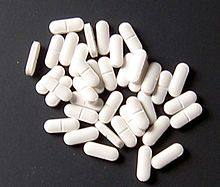
Back منوم Arabic Снатворныя сродкі BE Снатворныя сродкі BE-X-OLD Сънотворно лекарство Bulgarian Somnífer Catalan Hypnotikum Czech Hypnotika Danish Schlafmittel German Υπνωτικό Greek Hipnóticos Spanish
This is currently being merged. After a discussion, consensus to merge this with content from Somnifacient was found. You can help implement the merge by following the instructions at Help:Merging and the resolution on the discussion. Process started in July 2023. |

Hypnotic (from Greek Hypnos, sleep[1]), or soporific drugs, commonly known as sleeping pills, are a class of (and umbrella term for) psychoactive drugs whose primary function is to induce sleep[2] (or surgical anesthesia[note 1]) and to treat insomnia (sleeplessness).
This group of drugs is related to sedatives. Whereas the term sedative describes drugs that serve to calm or relieve anxiety, the term hypnotic generally describes drugs whose main purpose is to initiate, sustain, or lengthen sleep. Because these two functions frequently overlap, and because drugs in this class generally produce dose-dependent effects (ranging from anxiolysis to loss of consciousness), they are often referred to collectively as sedative–hypnotic drugs.[3]
Hypnotic drugs are regularly prescribed for insomnia and other sleep disorders, with over 95% of insomnia patients being prescribed hypnotics in some countries.[4] Many hypnotic drugs are habit-forming and—due to many factors known to disturb the human sleep pattern—a physician may instead recommend changes in the environment before and during sleep, better sleep hygiene, the avoidance of caffeine and alcohol or other stimulating substances, or behavioral interventions such as cognitive behavioral therapy for insomnia (CBT-I), before prescribing medication for sleep. When prescribed, hypnotic medication should be used for the shortest period of time necessary.[5]
Among individuals with sleep disorders, 13.7% are taking or prescribed nonbenzodiazepines, while 10.8% are taking benzodiazepines, as of 2010, in the USA.[6] Early classes of drugs, such as barbiturates, have fallen out of use in most practices but are still prescribed for some patients. In children, prescribing hypnotics is not yet acceptable—unless used to treat night terrors or sleepwalking.[7] Elderly people are more sensitive to potential side effects of daytime fatigue and cognitive impairments, and a meta-analysis found that the risks generally outweigh any marginal benefits of hypnotics in the elderly.[8] A review of the literature regarding benzodiazepine hypnotics and Z-drugs concluded that these drugs can have adverse effects, such as dependence and accidents, and that optimal treatment uses the lowest effective dose for the shortest therapeutic time period, with gradual discontinuation in order to improve health without worsening of sleep.[9]
Falling outside the above-mentioned categories, the neurohormone melatonin and its analogues (such as ramelteon) serve a hypnotic function.[10]
- ^ "Definition of HYPNOTIC". www.merriam-webster.com. Retrieved 2021-09-27.
- ^ "Dorlands Medical Dictionary:hypnotic". Mercksource.com. Archived from the original on 2008-12-11.
- ^ Brunton LL, Parker K, Lazo KL, Buxton I, Blumenthal D (2006). "17: Hypnotics and Sedatives". Goodman & Gilman's The Pharmacological Basis of Therapeutics (11th ed.). The McGraw-Hill Companies, Inc. ISBN 978-0-07-146804-6. Retrieved 2014-02-06.
- ^ National Prescribing Service (2 February 2010). "NPS News 67: Addressing hypnotic medicines use in primary care". Archived from the original on 22 February 2011. Retrieved 19 March 2010.
- ^ Mendels J (September 1991). "Criteria for selection of appropriate benzodiazepine hypnotic therapy". The Journal of Clinical Psychiatry. 52. 52 (Suppl): 42–46. PMID 1680126.
- ^ Kaufmann CN, Spira AP, Alexander GC, Rutkow L, Mojtabai R (June 2016). "Trends in prescribing of sedative-hypnotic medications in the USA: 1993-2010". Pharmacoepidemiology and Drug Safety. 25 (6): 637–645. doi:10.1002/pds.3951. PMC 4889508. PMID 26711081.
- ^ Gelder M, Mayou R, Geddes J (2005). Psychiatry (3rd ed.). New York: Oxford. p. 238.
- ^ Glass J, Lanctôt KL, Herrmann N, Sproule BA, Busto UE (November 2005). "Sedative hypnotics in older people with insomnia: meta-analysis of risks and benefits". BMJ. 331 (7526): 1169. doi:10.1136/bmj.38623.768588.47. PMC 1285093. PMID 16284208.
- ^ "What's wrong with prescribing hypnotics?". Drug and Therapeutics Bulletin. 42 (12): 89–93. December 2004. doi:10.1136/dtb.2004.421289. PMID 15587763. S2CID 40188442.
- ^ Zhdanova IV (February 2005). "Melatonin as a hypnotic: pro". Sleep Medicine Reviews. 9 (1): 51–65. doi:10.1016/j.smrv.2004.04.003. PMID 15649738.
Cite error: There are <ref group=note> tags on this page, but the references will not show without a {{reflist|group=note}} template (see the help page).